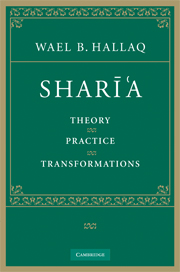Book contents
- Frontmatter
- Contents
- Preface and acknowledgments
- Introduction
- Part I The pre-modern tradition
- 1 The formative period
- 2 Legal theory: epistemology, language and legal reasoning
- 3 Legal education and the politics of law
- 4 Law and society
- 5 The Circle of Justice and later dynasties
- Part II The law: an outline
- Part III The sweep of modernity
- Appendix A Contents of substantive legal works
- Appendix B Chronology
- Bibliography
- Index
2 - Legal theory: epistemology, language and legal reasoning
Published online by Cambridge University Press: 05 June 2012
- Frontmatter
- Contents
- Preface and acknowledgments
- Introduction
- Part I The pre-modern tradition
- 1 The formative period
- 2 Legal theory: epistemology, language and legal reasoning
- 3 Legal education and the politics of law
- 4 Law and society
- 5 The Circle of Justice and later dynasties
- Part II The law: an outline
- Part III The sweep of modernity
- Appendix A Contents of substantive legal works
- Appendix B Chronology
- Bibliography
- Index
Summary
In the foregoing chapter, I took up two out of four developments that contributed to the formation of the Sharīʿa, namely, the judiciary and the legal schools. Part II of this book will present a conspectus of fiqh, the third development. In this chapter, the aim is to sketch the fourth and last component of the Sharīʿa, namely, legal theory, properly known as uṣūl al-fiqh.
In the previous chapter, I also discussed the Great Synthesis, which gave rise to a foundational definition of the conflated roles of reason and revelation in Sunnite Islam. Legal theory was perhaps the most determinative manifestation of this Synthesis which, in its final stages, emerged around the middle of the fourth/tenth century. This, needless to say, is precisely the period that witnessed the elaboration of the first complete system of legal theory. It is not easy, however, to reconstruct this system from the fragmentary sources that have survived from that period. Thus, to offer an informative and – for the later period – representative account of this theory, I utilize mainly the prolific and magnificently elaborated sources from the fifth/eleventh century, but not without occasional references to earlier and later works. The choice of that century has to recommend it the added fact that its theoreticians produced some of the most influential treatises for the course of theoretical developments in the centuries to come.
- Type
- Chapter
- Information
- Sharī'aTheory, Practice, Transformations, pp. 72 - 124Publisher: Cambridge University PressPrint publication year: 2009



